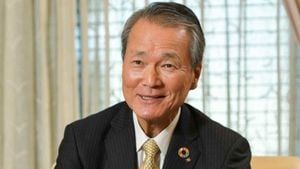Recent reports highlighting concerns surrounding labor conditions for educators and technical instructors in Spain have raised alarms about the systemic issues affecting both professional training and educational staff. The urgency for reforms has led to significant demands from labor groups such as UGT Enseñanza, which has been vocal about the need for enhanced funding for vocational training programs, known commonly as Formación Profesional (FP).
On December 16, 2023, UGT Enseñanza presented their findings from the report titled "Lo que no se dice de la FP en Aragón: Necesidades y propuestas," which brought to light various deficiencies within the vocational training system of Aragón. During the report briefing, Medea Gracia, the secretary of Education of UGT Aragón Servicios Públicos, expressed her concern over what she called the 'boom' of vocational training overshadowed by significant systemic issues. "Behind the boom of FP, there are many deficiencies," Gracia emphasized, pointing to inadequate funding, lack of organizational support, and, most controversially, the poor working conditions faced by educators.
UGT has called on the regional government to increase public FP offerings and funding. Their demands also include lowering student-to-teacher ratios, improving working conditions for educators, and enhancing collaborations with businesses to ease student access to practical training opportunities. Gracia pointed out, "The lack of funding limits the formative capacities of institutions and hampers the daily operations of professionals, causing marked discrepancies between teaching bodies. This gradually undermines the system." The union's central proposition for immediate action is to equalize salaries between technical FP instructors and their Secondary Education counterparts, advocating for fair compensation for similar roles. "It's unacceptable for teachers performing identical duties to receive different salaries,” she argued.
This call for reforms stems from the pressure on the training centers coping with increasing operational costs, which often forces them to divert funds meant for teaching materials to meet basic expenses. A notable illustration from the report was the case of IES Salvador Victoria, where allocated funding of around 10,000 euros failed to meet the rising costs, which for 2023 were approximately 19,000 euros.
The report also shed light on the high levels of temporary and precarious employment among technical instructors, with Gracia describing it as 'unprecedented discrimination.' It was noted within the report findings, for example, European Union regulations stipulate teacher temporary employment rates should be around 8 percent, yet for integrated FP centers, the rates flip drastically to between 30 and 50 percent across the region of Teruel, with almost 40 percent noted across conventional Secondary Education institutes.
These disparities are alarming and are aggravated by recent legislative changes. According to Gracia, alterations made through Real Decreto 2022 have permitted university-credentialed persons to transition to higher-paying teaching roles without regard to their actual teaching qualifications. Consequently, this has resulted in awkward scenarios where three instructors with different qualifications and salary levels co-teach the same class. Gracia lamented, “One profession, three different pay scales; it's absurd!”
Another acute issue raised involved the lack of hands-on experience among incoming instructors who prioritize formal qualifications over practical skills, resulting in educational gaps. Overall, Gracia stressed, "Each academic year, we see increasing student numbers and needs but continue facing challenges alongside resource scarcity and insufficient staffing.” This is particularly evident within departments like administration and health sciences, where enrolled students vastly trend toward private institutions.
While stakeholders recognize the rise of vocational training enrollment—claiming more than 28,000 students attended programs as of 2023—the increase has incited tension. UGT's report underscored operational complications arising from insufficient staffing levels, especially with new students required to engage with companies for internships without adequate prior training to support their placements. "Many companies are hesitant to take on students who show up without practical preparedness," Gracia noted. This misalignment creates greater barriers to successful FP completion.
Compounding these challenges are cuts to teaching hours, significantly limiting the number of available instructors per practical session. Gracia illustrated, “Imagine teaching 30 students with just one tractor or cooking station. It’s impractical! We cannot appropriately equip students without sufficient access to resources.” This scenario highlights the pressing need for systemic changes to adequately fund vocational programs.
Reflecting on the years to come, UGT is pushing for discussions with educational authorities to bridge these gaps. Upcoming meetings are expected to address proposed regulatory revisions to support the work environment for FP educators and employees, focusing squarely on elevatory measures and funding solutions.
On another front, the Sindicato de Empleados Públicos de Extremadura, known as SGTEX, took similar steps on December 13, 2024, discussing labor conditions for caregivers under the ATE-Cuidador/a classification. Representatives attended the inauguration of the Technical Negotiation Table with the Ministry of Education, underscoring their commitment to securing improved working terms and conditions. The Consejera de Educación expressed intentions to address the labor challenges faced by this collective, promising draft proposals to negotiate significant conditions for the upcoming academic year.
Both reports compellingly convey the urgency for legislative reforms and financial allocations for vocational training sector improvements and supportive conditions for educational employees across Spain. Educators and labor advocates alike stress the immediate need for structural adjustments to the educational framework to align appropriately with industry needs and students’ future job placements.



